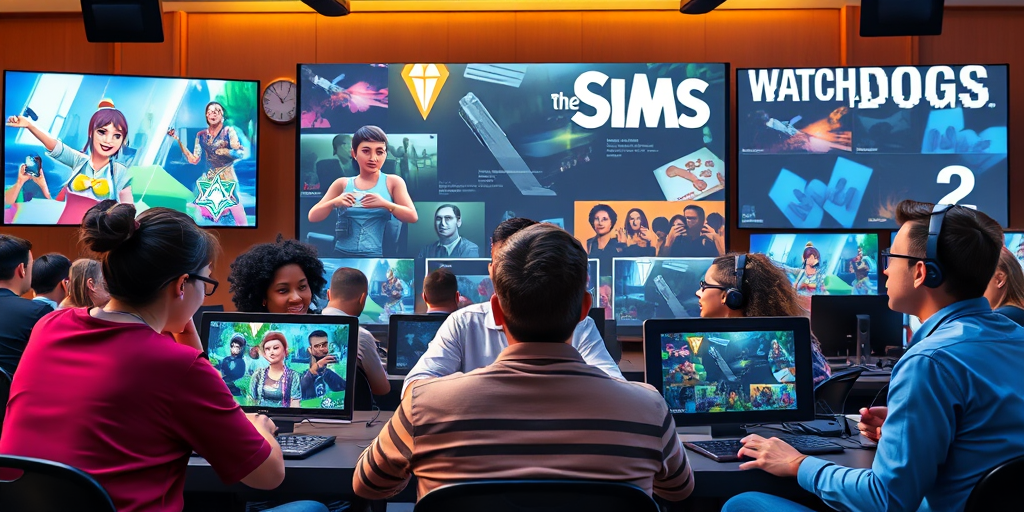Games That Embraced Inclusivity and Diversity: A Showcase of Empathy and Representation
As the gaming industry continues to evolve and expand its audience, inclusivity and diversity have emerged as critical components of game design and storytelling. Recent discussions highlight six standout video games that have made significant strides in these areas, using their narratives and themes to bridge cultural gaps, promote empathy, and celebrate diverse identities without oversimplifying them. This emerging trend not only reshapes the gaming landscape but also has profound implications for communities and players in the United States.
The Rise of Inclusivity in Gaming
Inclusivity in video games transcends mere representation; it’s about embedding diverse perspectives into gameplay mechanics and storylines. Notable titles like “Celeste,” “Watch Dogs 2,” “Undertale,” “The Walking Dead,” “Disco Elysium,” and “The Sims” series exemplify this movement. Through varied approaches, these games engage players with stories and characters that reflect a wide spectrum of human experience, and they resonate deeply with audiences seeking authentic representation.
For instance, “Celeste,” a precision platformer, tackles themes of social anxiety and gender identity within its storyline. The protagonist Madeline’s journey towards self-acceptance mirrors the struggles faced by many individuals in real life, fostering a sense of connection and understanding among players. In “Watch Dogs 2,” the game critiques systemic racism and biases in technology—a reflection of ongoing societal discourses—through its narrative and character diversity, set against the backdrop of the real-world Bay Area’s inclusive milieu.
Empathy through Gameplay
Games like “Undertale” subvert traditional violent game mechanics by encouraging players to engage with enemies through empathy rather than combat, thus promoting a message of understanding and coexistence. Its cast of diverse characters introduces players to non-traditional figures, normalizing varied identities and encouraging players to question preconceived notions about ‘the other.’
Meanwhile, “The Walking Dead” places players in a diverse group of everyday survivors in a zombie apocalypse, where character development and interdependence are prioritized over explicit statements on inclusivity. This approach offers a fresh perspective on human resilience and cooperation in adversity, reflecting the complex realities of diverse communities.
Reflecting Societal Issues
“Disco Elysium” provides a critical examination of societal issues such as systemic poverty and racism. It presents LGBTQ+ characters in a nuanced manner, tackling heavy subjects without appearing overly didactic. The game invites players to explore political and philosophical questions, challenging them to consider their own stances and biases within a fictional yet familiar world.
“The Sims” stands out for its subtle yet profound inclusivity, allowing players to create characters with non-binary representation and same-sex relationships without fanfare. This normalization of diverse identities in virtual life mirrors the ongoing push for acceptance in real-world communities, making it a beloved series for its positive portrayal of modern family dynamics and identity exploration.
Local Impact and Community Interest
For communities within the United States, particularly those in culturally diverse areas, these games hold significant importance. As noted by local gaming expert Dr. Emily Carter, “Games are a reflection of our society’s values and narratives. By embracing inclusivity, they not only entertain but also educate and promote empathy, which is crucial for social cohesion.”
The effects of such narratives are felt locally as they encourage a broader acceptance and understanding of different identities. For residents of the Rio Grande Valley and other diverse regions, these games offer a medium through which players can see their realities reflected, fostering a sense of belonging and affirmation.
The trajectory set by these games heralds a future where inclusivity becomes a standard rather than an exception in the gaming industry. This shift has the potential to influence other forms of media and arts, reinforcing the importance of diverse representation across all storytelling platforms.
However, as the discourse around inclusivity expands, it is vital to approach it with a balance between representation and creative authenticity. Critics caution against tokenism and advocate for meaningful inclusion that respects the complexities of identity and culture. This approach ensures that diversity in gaming continues to inspire genuine empathy and understanding among its players.
As inclusivity in gaming becomes more prevalent, residents and community members are encouraged to engage with these games, both as players and as part of the wider conversation on representation in media. Local gaming events and forums, such as those held by community centers or local branches of national gaming gatherings, provide platforms for dialogue and collaboration in creating more inclusive virtual worlds.
In conclusion, as video games continue to embrace inclusivity and diversity, they stand as powerful tools for bridging cultural divides and fostering empathy. These games not only entertain but also provide a window into the diverse tapestry of human experience, making them a significant influence on both the gaming industry and the broader cultural landscape. Through strategic storytelling and design, they hold the promise of shaping a more inclusive future for players and communities alike.







